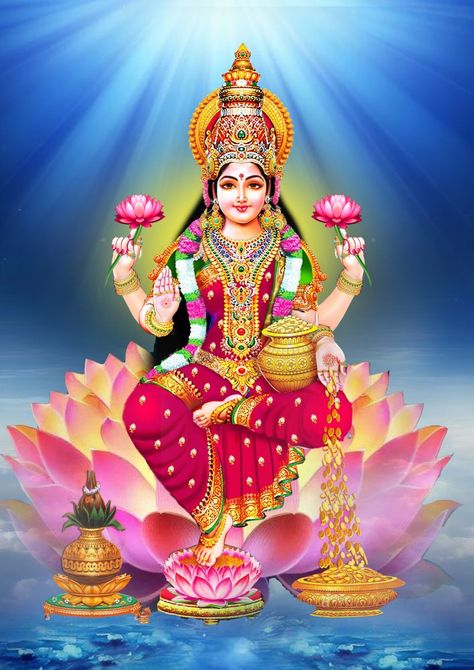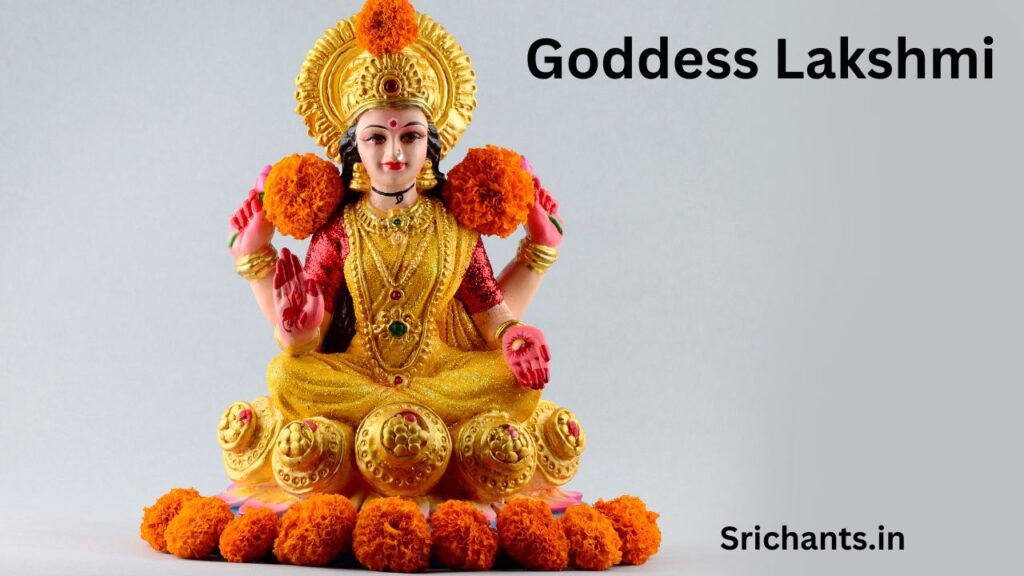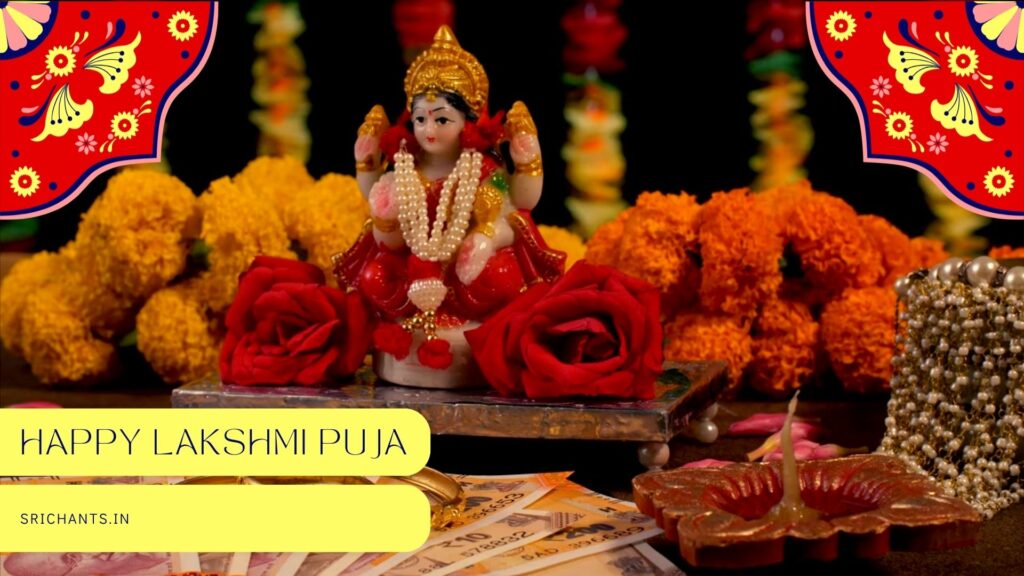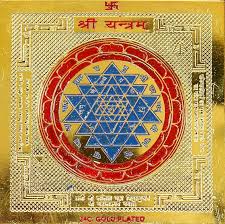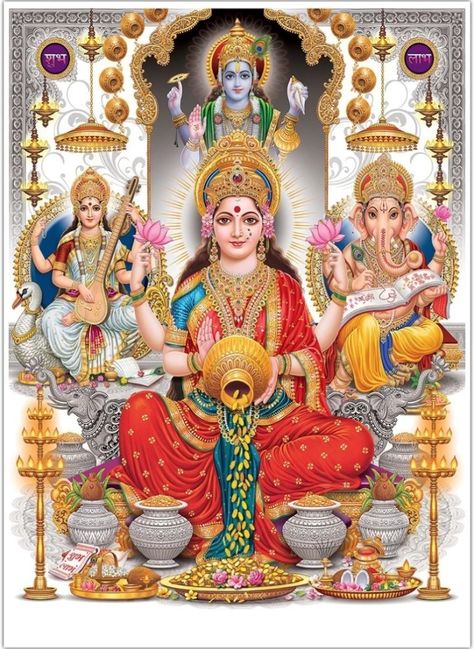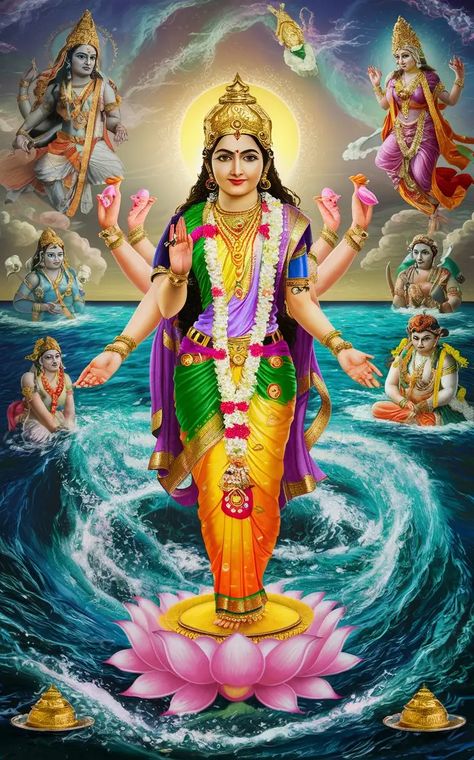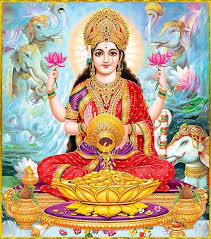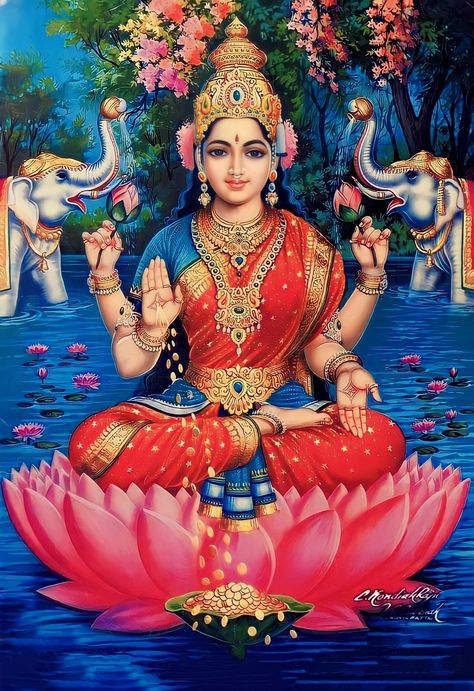Lakshmi Devi: The Divine Symbol of Wealth and Fortune
Introduction
Within the enormous and enthralling fabric of Hindu mythology, the holy Goddess Lakshmi is a lighthouse, representing the core of material success, spiritual fulfillment, and wealth. Consort of Lord Vishnu, the universe’s protector, Lakshmi’s impact goes well beyond the tangible world, her unending kindness and grace affecting the hearts and lives of her followers.
Respected all over the Indian subcontinent and beyond, Lakshmi is a part of Hindu culture that is woven into its very fabric through elaborate iconography, auspicious festivals, and age-old customs. With its richness of old writings and holy customs, her narrative provides a complex picture of the divine feminine and her influence on the material and spiritual well-being of her adherents.
Origins and Mythological Significance of Goddess Lakshmi
The earliest Hindu texts mention Goddess Lakshmi as the daughter of the renowned sage Bhrigu. She sprang from the depths, radiating beauty and grace, during the Samudra Manthan, the churning of the cosmic ocean.
Being the embodiment of Lord Vishnu’s shakti, or pure feminine force, and his heavenly consort, Lakshmi is highly revered in Hindu mythology. With Lakshmi’s blessings of wealth and prosperity inextricably linked to Vishnu’s function as the universe’s preserver and sustainer, this union represents the unbreakable link between the material and spiritual realms.
Icons & Symbolic Representations of Lakshmi
Rich in symbolism, every aspect of Goddess Lakshmi’s iconography has a deeper spiritual meaning. Many times, she is shown with four arms, signifying the four main objectives of human existence: moksha (liberation), artha (wealth), kama (desire), and dharma (righteousness). Her hands include gold coins to represent her position as the giver of monetary abundance and lotus blossoms, a symbol of purity and divinity.
Lakshmi travels via equally symbolic means, using the clever owl and the magnificent elephant as her vahanas (mounts). An elephant stands for power, aristocracy, and the capacity to clear the way; an owl for discernment, wisdom, and the capacity to see through illusion.
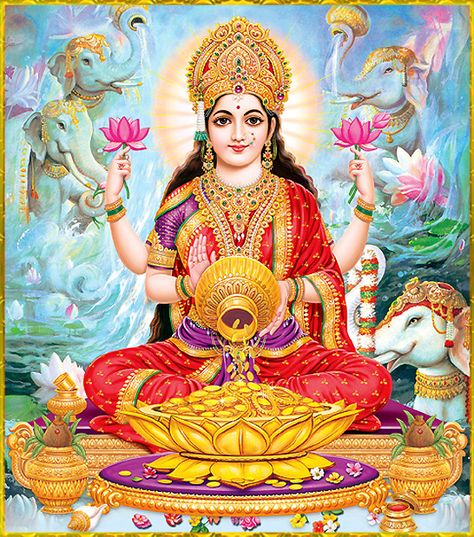
Goddess Lakshmi Manifestations and Forms
Many incarnations of Goddess Lakshmi are thought to symbolize different facets of her heavenly essence. Those consist of:
- Adi Lakshmi: Originally a deity, she stands for the divine feminine essence and the wellspring of all creation.
- The form linked to the bestowal of material wealth and prosperity is called Dhana Lakshmi.
- The form that gives strength, power, and the capacity to get beyond challenges is Gaja Lakshmi.
- Santana Lakshmi: The embodiment who bestows upon followers children and the continuation of their ancestry.
- Dhanya Lakshmi: The form associated with wealth and an abundance of agricultural produce.
- Veera Lakshmi: The form endowing with bravery, bravery, and the capacity to vanquish enemies.
- The form of victory over all obstacles and adversaries is called Vijaya Lakshmi.
- Aishwarya Lakshmi: The form that brings about all wants being fulfilled and material comforts and luxury.
Together referred to as Ashta Lakshmi, these eight manifestations of the goddess stand for the diversity of her attributes and the favors she can bestow upon her followers.
Hindu Holidays and Customs Lakshmi
With so many festivals and rites devoted to her love and veneration, Goddess Lakshmi’s influence permeates the Hindu calendar. Among these is the most well-known, Diwali, sometimes referred to as the “Festival of Lights,” which honors the victory of light over darkness and the favors of Lakshmi bestowed upon her followers.
Hindus light lamps, clean and decorate their homes, and make prayers and offerings as part of a variety of customs and activities to honour Lakshmi on Diwali. It is thought that by allowing Lakshmi into their houses, they will be inviting money, prosperity, and good fortune for the ensuing year.
The Ashwin month’s full moon night is Kojagara Purnima, another important festival connected to Lakshmi. On this auspicious day, followers remain up all night doing puja and asking Lakshmi for her blessings so they may have a successful and happy life.
Lakshmi in Zodiacal Associations and Hindu Astrology
Within Hindu astrology, the zodiac signs and the astrological connections that go along with them are intimately linked to Goddess Lakshmi. Every moon sign, or rashi, is thought to have a distinct Lakshmi that corresponds to its natural attributes.
Locals of Aries (Mesha), for example, are considered to be connected to the “Ramaa” form of Lakshmi, while those of Taurus (Vrishabha) are linked to the “Mohini” manifestation. Likewise, devotees of Gemini (Mithuna) may honor the goddess’s “Padmakshi” form and those of Cancer (Karka) the “Kamala” aspect.
These astrological links not only guide the particular mantras and ceremonies to be carried out but also shed light on the special ways that people of various zodiac signs may channel and use Lakshmi’s benefits.
An Overview of Lakshmi Mantras and Rituals
The hallowed chants and ceremonies handed down through the years by devotees are essential to the worship of Goddess Lakshmi. These age-old rituals help one to connect with Lakshmi’s compassionate spirit and to invite her heavenly presence.
Translating to “Salutations to the Goddess Lakshmi,” “Om Shri Lakshmi Devayai Namah” is one of the most often repeated Lakshmi mantras. It is thought that by requesting Lakshmi’s favor and blessings, this mantra opens the door to both material success and spiritual contentment.
Beyond chanting mantras, Lakshmi worship frequently include carrying out particular rites, such the Lakshmi Homa or Lakshmi Puja. The offering of flowers, incense, and other auspicious objects, together with the reading of holy hymns and poetry and the invocation of Lakshmi’s many forms, may be part of these ceremonies.
Hindu Culture and Society as Influenced by Lakshmi
Hindu society and culture have been profoundly impacted by Goddess Lakshmi, going beyond personal devotion and worship. Hindus’ attitude to their social and economic lives as well as the literary and artistic manifestations honoring her heavenly presence are all influenced by her.
Lakshmi is honoured as the patron goddess of wealth and financial success in the world of business and commerce. Before starting a new business or opening their accounts for the new year, Hindu merchants and entrepreneurs often ask for Lakshmi’s favor. A monument to her essential role in the community’s financial and economic well-being is the Diwali festival ceremony of Lakshmi Puja.
In addition, Hindu performance, literature, and art all incorporate Lakshmi. Lakshmi’s influence is felt throughout culture, from the elaborate Lakshmi Pada (footprint) designs seen in Rangoli patterns to the recitation of the Lakshmi Chalisa and the representation of Lakshmi in classical Indian dance forms.
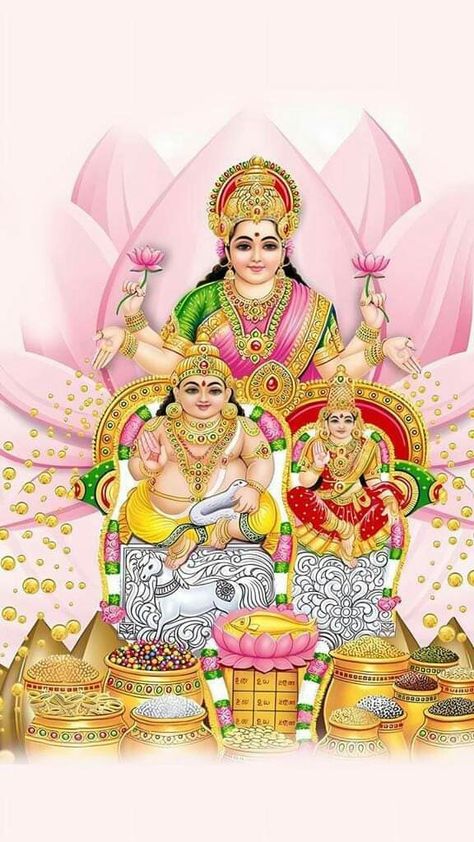
Sites of Pilgrimage and Lakshmi Temples
Goddess Lakshmi is worshipped at a great number of temples and holy places across the Indian subcontinent, each with a distinct past and meaning. These sacred places are centers of devotion where followers may seek the goddess’s favor and become fully engrossed in the rich fabric of Hinduism.
Among the most well-known Lakshmi temples are the Lakshmi Devi Temple in Doddagaddavalli, the Mahalakshmi Temple in Mumbai, the Mahalakshmi Temple in Kolhapur, and the Laxminarayan Temple in New Delhi. Pilgrims travel great distances to these hallowed places to offer their prayers and take part in the colorful festivals and ceremonies that honour the goddess.
Lakshmi and the Seeking of Enlightenment Spiritual
Even if Goddess Lakshmi is mostly connected to financial wealth and prosperity, her impact touches her followers’ spiritual goals and goes much beyond the material world. The ultimate aim of human life is, according to Hindu philosophy, the quest of spiritual enlightenment, or moksha, and Lakshmi’s divine grace is seen to be essential to this path.
The goddesses of wisdom and knowledge, Vidya Lakshmi, and patience and perseverance, Dhairya Lakshmi, are just two of the many ways that Lakshmi appears and reminds us that real fulfillment comes not only from achieving material wealth but also from cultivating inner tranquilly, spiritual development, and realizing the divine within.
By her blessings, followers of Lakshmi are urged to achieve a healthy balance between the material and the spiritual, understanding that the road to enlightenment is marked by both material success and the development of the divine essence inside.
Conclusion
A monument to the complex character of the divine feminine is the goddess Lakshmi’s long-lasting presence in Hindu mythology, culture, and religion. Offering a comprehensive view of the human experience that goes beyond the bounds of the material world, she continues to enthrall her followers as the embodiment of wealth, prosperity, and spiritual enlightenment.
Lakshmi’s influence permeates every part of Hindu life, guiding her followers towards a life of abundance, fulfillment, and the realization of the divine within through the rich tapestry of her iconography, the colorful festivals and rituals that honor her, and the profound insights of Hindu astrology. Discovering the deep wisdom that this revered goddess imparts as we go deeper into her mysteries and teachings encourages us to embrace the infinite grace that she bestows upon those who seek her divine blessings and to cultivate a harmonic balance between the material and the spiritual.
#lakshmi #lakshmidevi #devine #power #wealth
